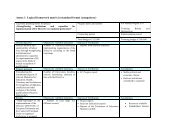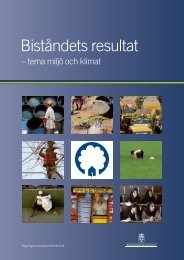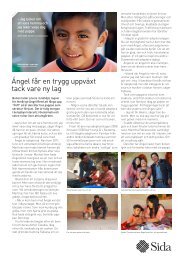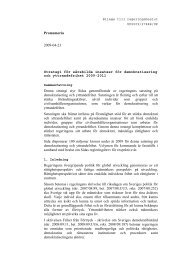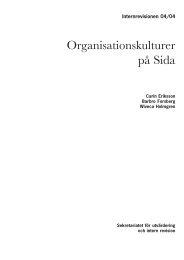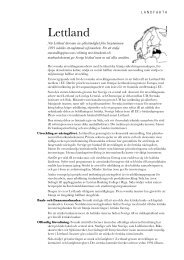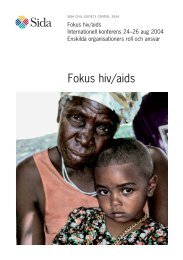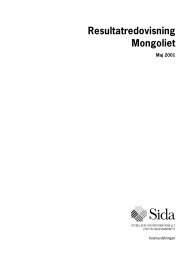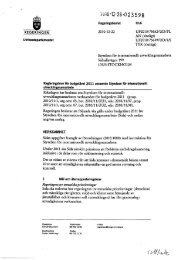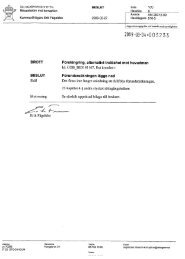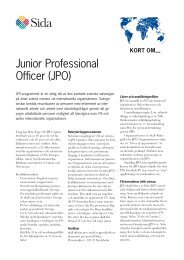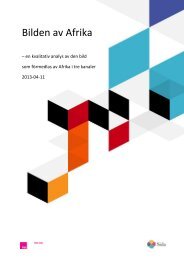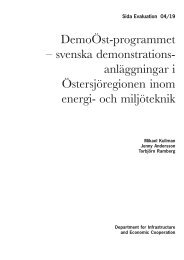Mid-Term Review of the AGIR Programme - Sida
Mid-Term Review of the AGIR Programme - Sida
Mid-Term Review of the AGIR Programme - Sida
Create successful ePaper yourself
Turn your PDF publications into a flip-book with our unique Google optimized e-Paper software.
A N N E X 2 – T E R M S O F R E F E R E N C E<br />
11. To learn about how <strong>the</strong> programme is perceived and accepted in civil society<br />
as a whole and among o<strong>the</strong>r donors as an alternative approach to support civil<br />
society.<br />
12. To learn <strong>the</strong> level <strong>of</strong> interaction and cooperation between <strong>the</strong> intermediaries<br />
and how <strong>the</strong>y have managed to pursue <strong>AGIR</strong> as one programme, with four<br />
sub-programmes, and how synergies are being sought and achieved.<br />
13. To determine if <strong>the</strong> balance between <strong>the</strong> need for local partners to have necessary<br />
capacity to receive core funds and <strong>the</strong> interest <strong>of</strong> intermediaries to disburse<br />
funds is kept at an adequate level as to ensure quality and minimising<br />
fiduciary risks.<br />
14. To learn if <strong>AGIR</strong> has had <strong>the</strong> intended effect in <strong>the</strong> Swedish Embassy, i.e.<br />
more time for programme <strong>of</strong>ficers to focus on content and qualitative followup<br />
<strong>of</strong> local partner organisations, and more programme <strong>of</strong>ficers involved in<br />
monitoring our civil society support.<br />
Methodology<br />
The evaluating team will be expected to ga<strong>the</strong>r and analyse information through document<br />
reviews, interviews and field visits to produce an evaluation report. An outline<br />
<strong>of</strong> <strong>the</strong> planned methodology should be described and justified in <strong>the</strong> tender documents.<br />
It is important that “second opinions” are ga<strong>the</strong>red from o<strong>the</strong>r sources than actors<br />
involved in <strong>the</strong> programme.<br />
A meeting should be held with all intermediaries and partner organisations to present<br />
draft conclusions, discuss <strong>the</strong> implications <strong>of</strong> <strong>the</strong>se and ga<strong>the</strong>r completing information.<br />
The consultants are expected to have an open and transparent discussion with key<br />
stakeholders on each <strong>of</strong> <strong>the</strong>ir main conclusions, on <strong>the</strong> type <strong>of</strong> sources <strong>the</strong>y were able<br />
to use, <strong>the</strong> extent to which <strong>the</strong>y were able to corroborate or triangulate <strong>the</strong> conclusion<br />
by o<strong>the</strong>r sources with a different perspective or stake, or if <strong>the</strong>y have any alternative<br />
explanation <strong>of</strong> <strong>the</strong>ir observations.<br />
Stakeholder involvement<br />
The evaluation team is expected to meet with <strong>the</strong> donors, intermediaries and a representative<br />
sample <strong>of</strong> partner organisations and beneficiaries both in Maputo and in<br />
several provinces. In addition to this, <strong>the</strong> team should ga<strong>the</strong>r information from independent<br />
sources to be able to get a comprehensive picture <strong>of</strong> <strong>the</strong> programme and its<br />
outcomes.<br />
The donors, intermediaries and partner organisations should furnish <strong>the</strong> evaluating<br />
team with documents, briefings and interviews as requested by <strong>the</strong> team.<br />
The rights and welfare <strong>of</strong> participants in <strong>the</strong> evaluation should be protected. Anonymity<br />
and confidentiality should be protected when requested and as needed.<br />
82



